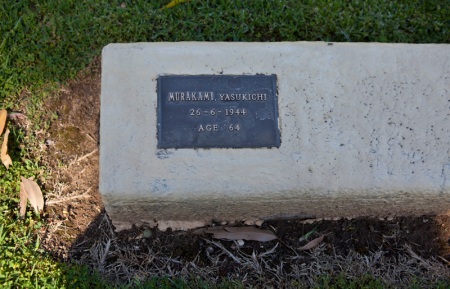My collaborator Dr Lorna Kaino and I drove through the Blue Mountains, past Bathurst and arrived in Cowra in search for Yasukichi Murakami’s grave.
My first visit to Cowra was in 1997 when I arrived at the Japanese Gardens to install fifty photographs from my exhibition Unseen Faces of Japan which had been exhibited at the Japan Cultural Centre Sydney (Japan Foundation) six months earlier. Since then I have been here a dozen times, and as years pass and my understanding of history, war, peace, and people have deepened, so has my understanding of Cowra.
Yasukichi Murakami is buried in the Japanese War Cemetery in Cowra. All Japanese people who died in Australia during WWII are buried here. Unknown airmen, POWs and civilian internees, like Murakami.
His grave somehow feels out of place.
Lorna commented that she somehow had been expecting a monument more outstanding as he was an outstanding figure in our minds. Yet like all graves around the world associated with war, his grave looks identical to everyone else’s, all neatly in a row one after another. Even with all his achievements and leadership, friendships with people in high places along with his 47 years in this country, none of it made any difference in the end.
But then again, every single person here buried would have a story to tell, a mother and a father, people they loved and people who loved them, even the 3 day old baby and the unknown airman who air raided Darwin. When I remember this I realise that Murakami, although may have a common grave like everyone, else has earned his name. He is in the Australian Dictionary of Biography. And here we are, Lorna and I, searching and finding his grave 67 years after his death.
– Posted by Mayu Kanamori

Hello, Yasukichi Murakami is my great grand father and my grand mother would be pleased to know anything about her father.
Hi Kaori
Thank you for writing. I have gathered much info and will be happy to forward them to you. I am in Darwin at the moment. My email is mayu@mayu.com.au Perhaps best we switched to emails.
Mayu
Hello Kaori, Julie Murakami here. can you send me an email – I have lost tyour address.
かおりさま
メールにて是非ご連絡ください。mayu@mayu.com.au
金森マユ
Pingback: About Murakami
I’ve been to Cowra too, and visited the cemeteries and the old POW camp. My husband is Japanese, and though he doesn’t have any relatives buried there, it is hard to confront that history of conflict. Thankfully, Australia and Japan get on a lot better now.
Pingback: Murakami for recognition and rememberance | About Murakami